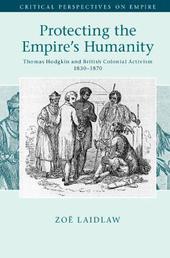
|
Protecting the Empire's Humanity: Thomas Hodgkin and British Colonial Activism 1830-1870
Hardback
Main Details
| Title |
Protecting the Empire's Humanity: Thomas Hodgkin and British Colonial Activism 1830-1870
|
| Authors and Contributors |
By (author) Zoe Laidlaw
|
| Series | Critical Perspectives on Empire |
|---|
| Physical Properties |
| Format:Hardback | | Pages:330 | | Dimensions(mm): Height 229,Width 152 |
|
| Category/Genre | British and Irish History
Colonialism and imperialism |
|---|
| ISBN/Barcode |
9781107196322
|
| Classifications | Dewey:941.081 |
|---|
| Audience | | Professional & Vocational | |
|---|
| Illustrations |
Worked examples or Exercises
|
|
Publishing Details |
| Publisher |
Cambridge University Press
|
| Imprint |
Cambridge University Press
|
| Publication Date |
23 September 2021 |
| Publication Country |
United Kingdom
|
Description
Rooted in the extraordinary archive of Quaker physician and humanitarian activist, Dr Thomas Hodgkin, this book explores the efforts of the Aborigines' Protection Society to expose Britain's hypocrisy and imperial crimes in the mid-nineteenth century. Hodgkin's correspondents stretched from Liberia to Lesotho, New Zealand to Texas, Jamaica to Ontario, and Bombay to South Australia; they included scientists, philanthropists, missionaries, systematic colonizers, politicians and indigenous peoples themselves. Debating the best way to protect and advance indigenous rights in an era of burgeoning settler colonialism, they looked back to the lessons and limitations of anti-slavery, lamented the imperial government's disavowal of responsibility for settler colonies, and laid out elaborate (and patronizing) plans for indigenous 'civilization'. Protecting the Empire's Humanity reminds us of the complexity, contradictions and capacious nature of British colonialism and metropolitan 'humanitarianism', illuminating the broad canvas of empire through a distinctive set of British and Indigenous campaigners.
Author Biography
Zoe Laidlaw is Professor of History at the University of Melbourne. She is the author of Colonial Connections 1815-45: Patronage, the Information Revolution and Colonial Government (2005) and co-editor, with Alan Lester, of Indigenous Communities and Settler Colonialism: Land Holding, Loss and Survival in an Interconnected World (2015).
Reviews'Through the entwined histories of Thomas Hodgkin and the Aborigines' Protection Society, Zoe Laidlaw builds a set of new narratives about the tense and tender interdependence of imperial humanitarianism and indigenous sovereignty. Mapping a far-flung ecosystem of liberal reformers and their dynamic, often contradictory, social/political formations, this study materializes the network of transimperial mobilities that animated white settler ambition.' Antoinette Burton, University of Illinois Urbana-Champaign 'This is an insightful and extraordinarily informative account of imperial humanitarianism in mid nineteenth century Britain. Laidlaw shows with depth and complexity the struggles of Thomas Hodgkin and the Aborigines' Protection Society to articulate and encourage a form of colonialism respectful of indigenous people's rights at a time when Britain's settler colonies were rapidly and often brutally expanding into indigenous lands. Her study of this ultimately impossible project, exploring its failures and occasional successes, enhances enormously our understanding of the nature and consequences of Britain's colonial empire.' Ann Curthoys, The University of Sydney 'Between the 1820s and the 1860s the multitalented Quaker medic and philanthropist Thomas Hodgkin was a focal point for influential discussions of racial difference, free labour, free trade, the nature of civilisation, duty and science, and the relationship between humanitarianism and colonialism in the Caribbean, the British settler colonies, the USA and India. This magisterial account of Hodgkin, his interlocutors and the organisations to which he contributed, founded on decades of scrupulous research, will change the way we think about mid-Victorian Britain and its Empire.' Alan Lester, University of Sussex
|